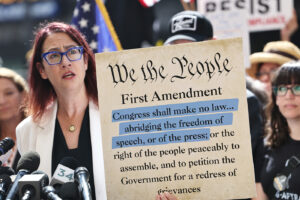January 14, 2025
A Legacy of Pardons – Biden’s Compassion vs. Trump’s Self-Interest
By John Myers
By Diana Villano

On December 1st, President Biden decided to grant a pardon to his son, Hunter Biden. While some argue the pardon is necessary for justice and family, as Biden defended himself, others suggest that the move reflects a deepening entanglement of personal and political interests. Ultimately, this decision raises important questions not only about this type of clemency but also about the nature of accountability, influence, and what this means for future political self-interests.
Biden issued a“‘full and unconditional pardon’ for any offenses Hunter Biden has ‘committed or may have committed or taken part in during the period from January 1, 2014, through December 1, 2024,’ according to the White House statement” as said in an NBC News article.
Hunter Biden’s conviction is rooted in a 2018 incident in which he illegally possessed a firearm while struggling with substance abuse issues, resulting in a misdemeanor conviction, which highlighted the struggles of a public figure with a troubled past. As a result, Hunter became a target for Republicans in an attempt to harm Biden. NBC News stated that “Republicans have for years attacked Hunter Biden over his foreign business dealings and accused him and the president of corruption. They have also argued that Hunter Biden was getting special treatment by the Justice Department because of his father’s political power.” On another hand, his father’s decision to pardon him is seen by some as an act of parental compassion as Hunter is legally unprotected.
However, it is essential to anticipate what the president’s actions will entail and imply future clemency-related actions. The decision to pardon Hunter Biden should be understood in the broader context of presidential pardons, especially in comparison to the way former President Donald Trump used his pardoning powers. Trump’s controversial pardons often involved allies, political associates, and individuals convicted of crimes related to his administration. The public perception of Trump’s pardons was that they were tools of self-preservation, designed not to address justice, but to reinforce political power. Along with those he pardoned in his first term, Trump “has promised to pardon Jan. 6 rioters during his second term” as said in an ABC News article.
In contrast, Biden’s pardon for his son may not share the same political overtones as Trump’s self-serving pardons, but it still raises similar questions about the proper use of presidential pardons. Is a president’s decision to pardon a family member a legitimate exercise of power, or does it appear to be a reflection of political favor and influence? While Biden’s decision could be framed as a private matter, the fact that it comes at a time when his son is under public and legal scrutiny complicates the narrative.
The situation raises questions spanning both parties, but one thing is sure, who can we trust? It’s officially been a month since the presidential election results, and we’ve heard public opinions, and seen individuals perplexed about the next four years; convictions destroyed. Some want to take back their vote, others regret not voting at all. Biden’s reversal of his statements has created mistrust along with his tarnished reputation. Pardoning his son may have been a pragmatic decision, as he runs out of time in office, the power soon transferring to President-elect Donald Trump.
In a situation where both parties condemned Biden’s pardoning, the aisles are set. Democrats are now rallying behind Biden, defending the pardon as “mild in comparison”, as reported by NBC News, to those issued by Trump and other past presidents, according to data collected by the Pew Research Center. Meanwhile, Republicans are seething with outrage over Biden’s decision, branding him a liar and a hypocrite.
Biden’s decision ultimately came down to choosing between being a politician and being a father. It’s natural to be inclined toward the latter. But can this be what we expect from our presidents and our government? A system where political power takes precedence over public interest? Is this the storm after the calm we had anticipated? Rather than directing our anger and blame toward a father whose power is waning, perhaps we should turn our focus to the alternative, a convicted felon, as we cautiously await the next four years.


